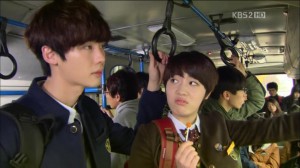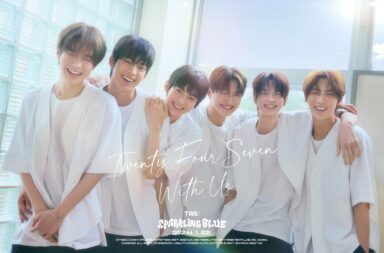 Girl group SISTAR (on whom I’ve drastically changed my ‘tude since their “I’m Alone” promotions) recently guested on Shinhwa Broadcast, where member So-yu revealed that she is a young woman who wears many proverbial hats. In addition to having become an idol singer (and one that actually possesses a pretty decent set of pipes at that), So-yu is also a licensed hairstylist. Amid laughter, she declared her desire to give Andy a new look using her learned tricks of the trade. To which I say: go for it, girl. Maybe then he won’t need to wear a baseball cap on television.
Girl group SISTAR (on whom I’ve drastically changed my ‘tude since their “I’m Alone” promotions) recently guested on Shinhwa Broadcast, where member So-yu revealed that she is a young woman who wears many proverbial hats. In addition to having become an idol singer (and one that actually possesses a pretty decent set of pipes at that), So-yu is also a licensed hairstylist. Amid laughter, she declared her desire to give Andy a new look using her learned tricks of the trade. To which I say: go for it, girl. Maybe then he won’t need to wear a baseball cap on television.
In response to So-yu’s “confession,” some netizens have expressed admiration or applauded her many diverse talents (singing and hairstyling? So-yu, you overachiever, you). Truly, though, it’s not a bad idea to have a professional license of some sort when one is an idol; there’s no denying that entertainment is an unpredictable business, and the career of an idol seems to hang in a perpetually precarious balance. Additionally, given the shelf life of idols in K-pop — an industry that prizes youth, beauty, and effervescence — it’s nice to have something to fall back on or to which one can return after the final curtain has closed.
However, other netizens have taken So-yu’s possession of a hairstylist license to be an implicit admission of her own delinquency — and have begun bandying about the word iljin:
[+29, -36] Oh.. I see… so she was one of those unnis who skipped school, learned hairstyling, smoked, and fooled around..
[+26, -25] Why is she getting all this hate for just having a license… It’s nothing to hate on her for. Not every girl with a hairstyling license means they were an iljin.
– Yes it does
– Hair dressing is the last career choice for iljins that sucked in school and have nothing better to do[+23, -17] A normal scene in front of any beauty school… 20 year old girls sitting around in groups with a cig in their mouths, spitting on the floor while swearing up a storm and glaring at anyone that passes by.. Talking about who they slept with at the club last night..
To make a long story short, So-yu is getting a lot of flack for having a hairstylist license because hairstylists (along with make-up artists, nurse’s aides, preschool teachers, and occasionally airline stewardesses, though this has largely changed in recent years) have a reputation of having been girls who behaved badly while they were in school. In other words, the assumption with many young women in these occupations is that they were iljin (일진).
So what are iljin?
Iljin is a tough word to define in exact terms. Formerly reserved exclusively for gangsters or members of the mafia, it was used to refer to the first round of fighters, or a group’s best fighters (literally, it means “first team”). Nowadays, it is used more frequently to refer to a school’s “bad” kids — the ones that are constantly disrupting class, getting in trouble, ditching school, smoking, drinking, and/or engaging in sexual activity. In spite of all the negativity with which they are associated, iljin are actually quite proud of their designation as such, and internet cafes and message boards have been created to allow iljin to communicate with each other and plan events. These events, unfortunately, are basically giant parties where underage students engage in a whole smattering of behavior that would make most parents faint; past attendees have alluded to sexy dance competitions (hey, this sounds familiar), make-out and groping competitions, and competitions that involve stripping down and imitating sex for the grand prize of a couple of packs of cigarettes. It was also confirmed that girls are auctioned off to older men for (yet again) the grand prize of a couple of packs of cigarettes. Charming.
 Though an article that appeared in the DongA Ilbo‘s English edition asserted that high achieving students may also be iljin, the general connotation is that iljin students (both male and female) do not study well and often drop out of high school — and thus are relegated to working jobs that don’t require a college degree. Because becoming a hairstylist requires only attending a hairstylist’s hakwon (학원), or academy, it is considered a last-ditch career choice — something that ijlin that either lack the ambition or the grades to attend college can do in order to earn money for themselves. Honestly speaking, the whole thing is almost hilariously ironic; hairstyling is no joke in South Korea (or really anywhere, for that matter), and hairstylists must be skilled at performing a variety of ever-changing cuts and treatments. Women (and men) trust their stylists to perm their hair (both wavy perms and digital perms are extremely, extremely popular in South Korea), bleach and dye their hair, and cut their hair according to the latest trends. Few “low skill” professions have as little room for error as does hairdressing — a botched cut is, as we all know, basically impossible to cover up. Personally, this writer has gotten her hair cut in Seoul multiple times and found all of the stylists to be exceedingly polite, professional, and skilled. But a stereotype is a stereotype, and due largey to the correlation between iljin and the profession, female hairstylists are consequently portrayed as something of a mother-in-law’s nightmare.
Though an article that appeared in the DongA Ilbo‘s English edition asserted that high achieving students may also be iljin, the general connotation is that iljin students (both male and female) do not study well and often drop out of high school — and thus are relegated to working jobs that don’t require a college degree. Because becoming a hairstylist requires only attending a hairstylist’s hakwon (학원), or academy, it is considered a last-ditch career choice — something that ijlin that either lack the ambition or the grades to attend college can do in order to earn money for themselves. Honestly speaking, the whole thing is almost hilariously ironic; hairstyling is no joke in South Korea (or really anywhere, for that matter), and hairstylists must be skilled at performing a variety of ever-changing cuts and treatments. Women (and men) trust their stylists to perm their hair (both wavy perms and digital perms are extremely, extremely popular in South Korea), bleach and dye their hair, and cut their hair according to the latest trends. Few “low skill” professions have as little room for error as does hairdressing — a botched cut is, as we all know, basically impossible to cover up. Personally, this writer has gotten her hair cut in Seoul multiple times and found all of the stylists to be exceedingly polite, professional, and skilled. But a stereotype is a stereotype, and due largey to the correlation between iljin and the profession, female hairstylists are consequently portrayed as something of a mother-in-law’s nightmare.
 Perhaps unsurprisingly, So-yu isn’t the first celebrity to have been accused of an iljin past. Of these, T-Ara‘s Hyo-min is probably the most infamous. Around the time that the T-Ara implosion occurred, netizen snooping produced pretty concrete evidence that Hyo-min was a self-proclaimed iljin (her name, photo, and ID were found on a list of attendees for an iljin party on a community message board). Efforts to trace her ID to an email account produced an email address that is identical to her Twitter handle. Photos of After School‘s Nana at what appear to be parties also garnered netizen suspicion of former iljin-hood, while KARA‘s Ji-young was questioned about a reputation of having been a leading bully in her high school in Paju, South Korea. Additionally, numerous netizens who claimed to have gone to school with Co-ed School‘s former member Kang-ho levied accusations of serious bullying, shoplifting, and rape against him.
Perhaps unsurprisingly, So-yu isn’t the first celebrity to have been accused of an iljin past. Of these, T-Ara‘s Hyo-min is probably the most infamous. Around the time that the T-Ara implosion occurred, netizen snooping produced pretty concrete evidence that Hyo-min was a self-proclaimed iljin (her name, photo, and ID were found on a list of attendees for an iljin party on a community message board). Efforts to trace her ID to an email account produced an email address that is identical to her Twitter handle. Photos of After School‘s Nana at what appear to be parties also garnered netizen suspicion of former iljin-hood, while KARA‘s Ji-young was questioned about a reputation of having been a leading bully in her high school in Paju, South Korea. Additionally, numerous netizens who claimed to have gone to school with Co-ed School‘s former member Kang-ho levied accusations of serious bullying, shoplifting, and rape against him.
Are these the only idols who might have been (or definitely were) iljin? Probably not. And really, it’s bad news when a society glorifies bullies who caused serious pain (and in some cases, permanent damage) to people they met in the past. But it is also bad news when a society writes off entire professions because of stereotypical associations — thereby cheapening the efforts of young women and men who chose to become hairstylists, nurse’s aides, and what have you. So-yu’s admission highlights two problematic methods of deling with iljin in Korean society — and it seems that solutions to either won’t come easily or soon.
Do you have any thoughts on iljin? Share them below!

